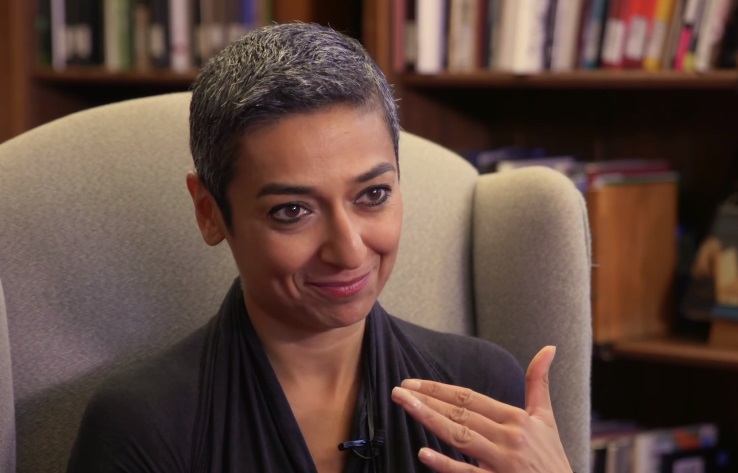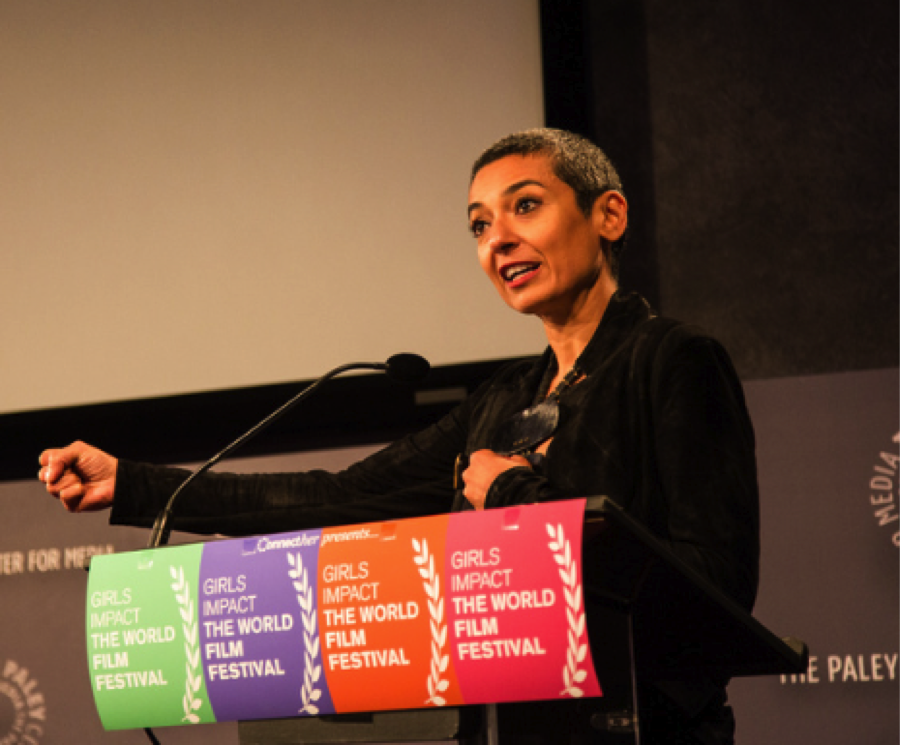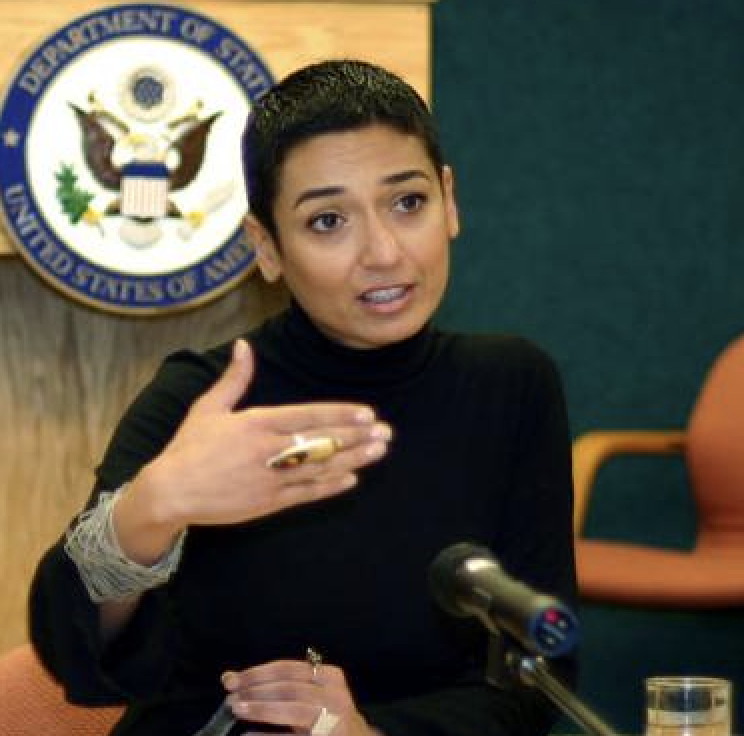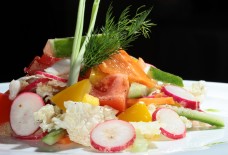Pathbreakers of Arab America—Zainab Salbi

By: John Mason / Arab America Contributing Writer
This is the fifty-sixth of Arab America’s series on American pathbreakers of Arab descent. The series includes personalities from entertainment, business, sports, science, academia, journalism, and politics, among other areas. Our fifty-sixth pathbreaker is Iraqi American Zainab Salbi, prolific author, media host, humanitarian, podcaster, and a representative ‘par excellence’ of what is best about Arab America. Zainab was born in Iraq during the period of Saddam Hussein’s rise to power. Presently living in the U.S., she is one of the leaders of the worldwide women’s rights movement.
Growing up in Baghdad, too close for comfort to Saddam Hussein, Zainab came to America to become a leading women’s activist
Zainab Salbi, a Muslim, was born in Baghdad in 1969. She grew up with her parents and brother in the Mansour district. According to the Wikipedia Series on Arab Americans, her mother was a biology teacher and her father was an airline pilot. When Zainab was 11, her father became the personal pilot for Saddam Hussein, who then regularly visited the family at their home while he was president of Iraq. The Iran-Iraq War occurred during her childhood, including missile attacks on Baghdad. Zainab studied languages at an Iraqi university.
In 1990, at age 20, Salbi’s parents sent her to the United States for an arranged marriage. This was a response to her mother’s concern over Saddam’s growing attention to Zainab during his visits. Zainab’s arranged marriage was unsuccessful, though she could not return to Iraq due to the start of the first Gulf War. She then moved to Washington, D.C., where she worked as a translator. There Zainab married Palestinian-American lawyer Amjad Atallah. She became a U.S. citizen in 1996 and completed her bachelor’s degree in sociology and women’s studies at George Mason University. She earned a master’s in development studies from the London School of Economics in 2001.
Salbi is an Iraqi American women’s rights activist and humanitarian, writer, television show host, and podcaster. She is a co-founder of Daughters for Earth, “a fund and a movement of Daughters rising up worldwide with climate solutions to protect and restore Mother Earth.” Zainab is also the co-founder of Women for Women International, a non-profit organization that helps women affected by sexual violence and conflict. She hosted ‘Through Her Eyes and #MeToo, Now What?’ television shows, featuring issues affecting women. From 2022 she hosted the ‘Redefined’ podcast.

While studying at George Mason University, Salbi learned about the systematic rape perpetrated against Muslim women during the Bosnian war. In response, she and her husband Atallah launched Women for Women International in 1993. Initial support of the movement focused on women in Bosnia-Herzegovina and Croatia, then, expanded to Iraq in 2003. By 2011, the movement’s humanitarian and development efforts helped 315,000 women and distributed over $108 million in direct aid and micro-credit loans. While working in 185 countries, her organization focused on Afghanistan, Bosnia, the Democratic Republic of the Congo, Kosovo, Nigeria, Rwanda, Sudan, and Iraq.
Salbi’s notoriety grew as Women for Women’s impact grew. By 2006 she had appeared on ‘The Oprah Winfrey Show ‘six times. Hilton Humanitarian awarded its Prize of $1.5 million to the organization. In 2015, Salbi launched the TLC Arabia talk show ‘The Calling,’ with Oprah Winfrey appearing on the first show. The show was broadcast in 22 countries in the Middle East and North Africa and focused on Arab and Muslim women. In response to her television work, Zainab has been called the “Oprah of the Middle East” and “The Voice of Arabia”. She has developed several additional projects through TV and newspapers.
In 1995, President Bill Clinton honored Salbi at the White House for her humanitarian work and identified her as a “21st Century Heroine”. ‘Time’ magazine named her Innovator of the Month in March 2005 and she was later profiled for her work as a philanthropist. In April of the same year, Salbi received a ‘Forbes’ magazine ‘Trailblazer Award.’ Gulf Business declared her one of the 100 ‘Most Powerful Arabs’ in 2019, noting her role in leading Women for Women International. Many other noteworthy organizations have awarded Zainab honors, including several honorary doctorates, but are too numerous to list.
Details of Zainab’s success, her route to becoming a highly celebrated Arab American author, humanitarian, and activist
Zainab’s success is partly reflected in two of her several books. The first is ‘Between Two Worlds: Escape from Tyranny: Growing Up in the Shadow of Saddam,’ a memoir written in 2005. The book, with the assistance of journalist Laurie Becklund, documents Salbi’s childhood in Baghdad, Iraq where, as noted earlier, her father was the private pilot for President Saddam Hussein. It was praised for giving readers insight into the character of Saddam.
Zainab’s second book is ‘Freedom Is an Inside Job: Owning Our Darkness and Our Light to Heal Ourselves.’ This is an autobiographical account of how, as she was helping thousands of women in war-torn countries, her personal life was coming to a crisis. Salbi explores her riveting journey to wholeness – and how embarking on such a journey enables each of us to create the world we want to live in. Through personal anecdotes, real-life stories, parables, and insightful guidance, Salbi takes us through a process of self-discovery. We learn to uncover our hidden motives and desires so we can live in alignment with our authentic values. “As long as we are conflicted within, we will continue to live in conflict without”, writes Salbi. “If we want to change the world, we must begin with ourselves.”
One perhaps lesser-known aspect of Zainab’s life is an illness that derailed her activism. Appearing in a story in ‘Bon Appetit magazine, it tells how she collapsed en route to deliver a talk to young philanthropists. “She was rushed into emergency surgery and spent the next few days in the ICU with a mystery illness. When she awoke from anesthesia, she was having trouble breathing and believed she would die. In her hospital bed, she was surprised to discover that she was not asking herself whether she had accomplished enough in her life, but whether she “lived in kindness” to herself and others.”

Zainab’s illness was eventually diagnosed as either an “unknown viral infection” or Lyme disease, she says, “depending on the doctor.” Over the next 18 months of recovery, with both her physical and cognitive abilities impaired, Salbi spent several hours every day meditating, “because I couldn’t think, I couldn’t write,” she says. This period of intensive reflection brought forth an existential crisis. “If I can’t [be] the activist or the writer or the journalist or whatever, then who am I?” she wondered.
But a year ago, and 12 months into her recovery, she moved to a cabin in Dutchess County, New York, adopted a cat, started tending to a vegetable garden, and switched to a plant-based diet. “To be very honest, I thought I had retired [from humanitarian work],” she says. But after springing into action last month to help evacuate Afghan women leaders whose lives were threatened, she believes her profound lifestyle change has allowed her to become more effective as an activist.
Apropos of this story’s appearance in a food magazine, ‘Bon Appetit’, as part of Zainab’s recovery, an alternative doctor instructed her to switch to a plant-based diet. Within a week, she says, her pain disappeared and she became “so grateful to earth.” Zainab avers that her recovery has resulted in a sense of wellness, and a Zen lifestyle, but accompanied by a renewed sense of activism.
A final note about Zainab’s journey is reflected in a recent ‘Time’ magazine piece on its award to her, The Time 100 Impact Awards. She spoke in that article on what it means to be a woman in a war zone. As a child growing up in Iraq in the ‘80s during the Iran-Iraq War, Salbi witnessed firsthand the resilience of the women around her. Zainab noted, “Women fought back. Not with weapons, they fought back by keeping the essence of life going.” That experience was part of her reason for founding Women for Women International.
From the organization’s inception, the ‘Time’ article continued, Salbi made a promise to herself about the type of leader she wanted to be. “Then 23, Salbi vowed that after two decades, she would pass the reins to someone else…Salbi delivered on her promise 10 years ago, when she departed the organization she calls her only child, though gender equality remains a central theme in her work. Above all else, Salbi believes that inspiring women is the “secret sauce” to affect meaningful change when paired with education and economic empowerment.”
Kudos to that and to Zainab, a courageous Arab American who continues to contribute to peace and well-being in the world.
Sources:
–“Zainab Salbi,” Wikipedia Series on Arab Americans, 2024
–‘ Between Two Worlds: Escape from Tyranny: Growing Up in the Shadow of Saddam,’ a 2005 memoir by Zainab Salbi (synopsis)
–‘ Freedom Is an Inside Job: Owning Our Darkness and Our Light to Heal Ourselves and the World,’ Zainab Salbi, 2016
–“After Illness Derailed Her Activism, Zainab Salbi Is Doing More Than Ever,” Bon Appetit, 10/12/2021
–“To Zainab Salbi, Supporting Women Is Key to Social Progress,” THE TIME 100 IMPACT AWARDS,” Time Magazine, 9/12/2023
John Mason, Ph.D., focuses on Arab culture, society, and history and is the author of LEFT-HANDED IN AN ISLAMIC WORLD: An Anthropologist’s Journey into the Middle East, New Academia Publishing, 2017. He has taught at the University of Libya, Benghazi, Rennselaer Polytechnic Institute in New York, and the American University in Cairo; John served with the United Nations in Tripoli, Libya, and consulted extensively on socioeconomic and political development for USAID and the World Bank in 65 countries.
The views and opinions expressed in this article are those of the author and do not necessarily reflect the position of Arab America. The reproduction of this article is permissible with proper credit to Arab America and the author.
Check out our Blog here!









